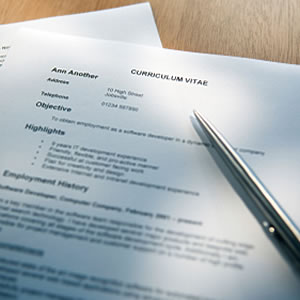If you haven’t already lined up an internship for the summer, you’re already behind schedule.

Most companies like to get their interns selected either in the late fall or winter, but just because you’re applying a little later doesn’t mean it’s time to give up.
If you’re serious about finding an internship for the summer, it’s time to pull out that resume and start applying! Here are some tips to get your resume in tip-top shape.
1. Get a proofreader
Since you’ve probably been staring at your resume for hours, you’re bound to make grammatical and/or spelling errors. All the more reason to ask someone else to look it over for you. Whether it’s your roommate, a professor or even your mother, the more eyes the better!
2. Keep it simple, stupid
Be as concise as possible. Don’t use that long, meaningless word when a simpler, shorter word will do. The goal is for it to read as smoothly as possible.
3. Make it look decent
No matter what field you’re in, it’s important to get that resume looking pretty. Whether you’re in a profession that values creativity or one that prefers seeing the same Times New Roman font over and again, make sure your resume is aesthetically pleasing to the eye. Make sure all of your bullet points line up, that your spacing is consistent and that everything is the same size font. Pay attention to the details!
4. Watch word choice
Use active verbs that make your resume pop and stay away from using passive voice as much as possible. Also refrain from using words that could be taken in a negative tone.
5. Create multiple versions
If you’re going for jobs in all sorts of different fields, your resume will not work as a one-size-fits-all. Some achievements/experience may be relevant to one job, while one will be looking for something entirely different. Make sure to create different versions for different types of internships.
6. Add relevant college extracurriculars
Don’t feel like you can only put internships on your resume. Brainstorm and think about how the skills you’ve learned from your extracurriculars could tie into the job you’re applying for. Being a leader in any college organization is definitely a good experience to add to a resume.
7. Reference job description
While your resume shouldn’t be a cookie-cutter version of the job description, look at the skills required for the position and see if you are on track. For example, if the focus of the job listing is having organization skills, make sure your resume shows how you used your organizational skills to succeed in other work environments.
8. Check your contact information
A blogger for Monster told this tale, which should scare you:
“I once worked with a student whose resume seemed incredibly strong, but he wasn’t getting any bites from employers. So one day, I jokingly asked him if the phone number he’d listed on his resume was correct. It wasn’t. Once he changed it, he started getting the calls he’d been expecting. Moral of the story: Double-check even the most minute, taken-for-granted details — sooner rather than later.”


